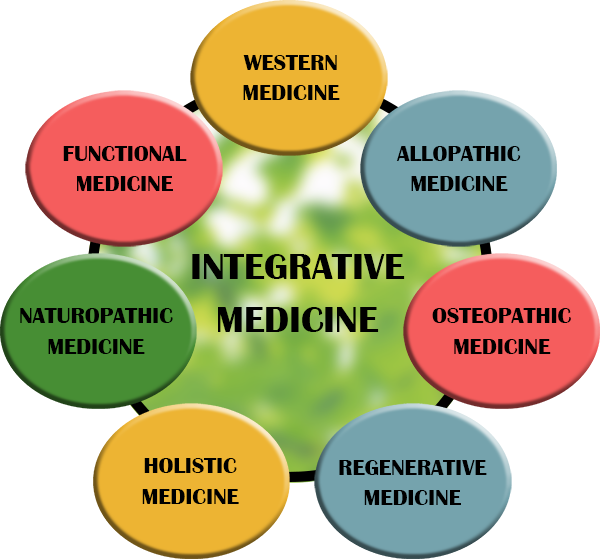Functional Medicine Explained: How It Focuses on Balance, Prevention, and Root Causes
Introducing the Recovery Methods of Functional Medicine and Holistic Medicine for Optimum Wellbeing
The exploration of functional and holistic medicine reveals unique yet linked pathways to wellness (Holistic Medicine). Functional medicine looks for to discover the underlying reasons for disorders, while holistic medicine embraces a wider viewpoint of wellness that includes spiritual and psychological measurements. With each other, these methods offer a framework for individuals to take cost of their wellness trips. This conversation will highlight the principles, methods, and differences in between these methods, inviting further consideration of their combined capacity
Recognizing Functional Medicine: Principles and Practices
Functional medicine represents a standard change in medical care, emphasizing a patient-centered approach that seeks to recognize and attend to the root root cause of health problem. This version incorporates scientific research with medical experience, checking out clients as distinct individuals instead than mere signs and symptoms of a disease. Specialists of functional medicine employ a systems biology perspective, discovering the communications between genetic, ecological, and lifestyle elements that contribute to wellness end results.
Key concepts consist of individualized treatment strategies customized to the individual's particular demands, promoting a collective relationship between patient and practitioner. Functional medicine additionally focuses on preventative treatment, concentrating on way of life alterations, nutrition, and tension monitoring to support general wellbeing. This approach motivates people to take an energetic duty in their health and wellness, bring about enhanced results and a deeper understanding of their problems. Inevitably, practical medicine intends to bring back equilibrium and promote health, changing the medical care experience right into among empowerment and holistic recovery.

The Holistic Medicine Approach: Integrating Mind, Body, and Spirit
While numerous medical care techniques focus only on physical signs and symptoms, alternative medicine emphasizes the interconnectedness of mind, body, and spirit in the pursuit of excellent health and wellbeing. This integrative technique acknowledges that mental and emotional variables substantially influence physical health and wellness, leading experts to ponder the entire individual during treatment. Holistic medicine utilizes varied methods, including meditation, way of life, and nourishment modifications, to cultivate equilibrium and harmony within the person.
Practitioners frequently involve individuals in discussions about their emotions, relationships, and life experiences, acknowledging that these elements can impact overall health and wellness. By resolving underlying issues and promoting self-awareness, alternative medicine aims to empower individuals in their healing trip. Holistic Medicine. This standard change encourages a proactive strategy to wellness, advocating for preventive procedures and way of life modifications instead of just dealing with signs. Inevitably, holistic medicine looks for to grow a deeper link between mind, body, and spirit, promoting thorough health and wellbeing and personal growth

Key Differences Between Functional and Holistic Medicine
Although both functional and holistic medicine focus on extensive person care, they differ substantially in their techniques and philosophies. Functional medicine stresses a systems-oriented method, concentrating on recognizing and dealing with the underlying causes of illness. Specialists frequently use advanced analysis testing and individualized therapy plans, which may include way of life drugs, supplements, and adjustments to bring back balance within the body's systems.
On the other hand, holistic medicine adopts a broader perspective, taking into consideration the emotional, spiritual, and environmental factors affecting an individual's health. It seeks to promote total well-being via a mix of different treatments, such as meditation, acupuncture, and yoga exercise, alongside traditional treatments.

Common Conditions Dealt With by Functional and Holistic Medicine
Several individuals look for both functional and holistic medicine for a variety of common health problems. These methods are typically employed to address persistent health problems such as diabetic issues, high blood pressure, and autoimmune problems (Learn More). Functional medicine focuses on determining underlying causes with comprehensive helpful hints evaluations, while alternative medicine highlights the interconnectedness of the spirit, mind, and body
Psychological health issues, consisting of stress and anxiety and anxiety, are also often dealt with within these structures, as they take into consideration emotional and mental variables alongside physical signs and symptoms. In addition, digestive disorders like cranky bowel syndrome (IBS) and food sensitivities are usual worries, with both practices promoting for nutritional alterations and way of life adjustments.
People might likewise turn to these techniques for problems such as chronic tiredness syndrome and fibromyalgia, where traditional therapies may fail. By incorporating numerous healing strategies, holistic and practical medicine aim to foster general well-being and improve lifestyle for those impacted.
Just how to Pick the Right Strategy for Your Health And Wellness Trip
How does one identify the most suitable health technique amidst the myriad of choices offered? The decision in between practical and holistic medicine needs mindful factor to consider of specific requirements and choices. One need to assess their wellness objectives, whether they look for signs and symptom relief or a much deeper understanding of underlying issues. Next, assessing one's medical background and present conditions can offer clearness on which approach may be most helpful.
Appointment with health care experts experienced in both fields can offer beneficial insights. Recognizing the concepts of each approach-- practical medicine's emphasis on biological systems and alternative medicine's focus overall person-- can assist in making an informed selection. Additionally, taking into consideration personal worths and comfort with therapy modalities, such as alternate treatments or nutritional adjustments, is necessary. Eventually, a tailored technique that aligns with one's lifestyle and beliefs will certainly foster an extra reliable health trip.
Often Asked Questions
Are Functional and Holistic Medicine Covered by Insurance Coverage Plans?
Insurance policy insurance coverage for functional and alternative medicine varies considerably by plan and service provider - Learn More. Some insurance coverage business may use partial repayment, while others do not cover these alternative methods at all, needing out-of-pocket settlements from people
How Much Time Does Therapy Commonly Take in These Methods?
Treatment duration in alternative and functional medicine varies commonly, commonly ranging from a few weeks to a number of months. Aspects affecting this include specific health and wellness conditions, therapy plans, and the individual's commitment to way of living adjustments.
Can I Integrate Functional and Holistic Medicine With Conventional Treatments?
Yes, individuals can incorporate functional and alternative medicine with standard treatments. This integrative strategy may boost total wellness, however seeking advice from doctor is necessary to ensure safety and performance in handling therapy strategies.
What Credentials Should Specialists of These Methods Have?
Practitioners of functional and holistic medicine must possess appropriate levels in medicine or health and wellness scientific researches, along with specialized training in their respective areas - Learn More. Certifications from acknowledged organizations improve reliability and guarantee adherence to developed requirements of treatment
Exist Particular Diets Recommended in Functional or Holistic Medicine?

In alternative and useful medicine, specific diet regimens frequently include entire foods, plant-based alternatives, and removal diet regimens customized to specific needs. Emphasis lies on nutrient density and preventing refined foods to improve general health and wellness and wellness.
Functional medicine seeks to reveal the underlying causes of ailments, while all natural medicine accepts a broader point of view of health that includes spiritual and psychological measurements. While functional medicine is much more medically oriented, stressing biological procedures, alternative medicine highlights the interconnectedness of different life facets. Numerous people look for both practical and alternative medicine for a selection of common health and wellness problems. Comprehending the concepts of each strategy-- functional medicine's focus on organic systems and alternative medicine's emphasis on the whole person-- can aid in making an educated option. Professionals of holistic and practical medicine must possess appropriate levels in medicine or health scientific researches, alongside specialized training in their respective fields.